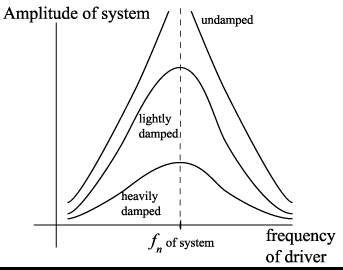    |
||||
 Resonance Resonance |
||||
|
A system can be made to oscillate by means of a periodic external driving force. When a system oscillates without an external driving force, the system is said to be oscillating at its natural frequency, fn. Suppose such a system is driven with varying frequencies and the resultant system amplitude plotted against driving frequency.
Amplitude is a means of measuring of how much energy is in a S.H.M. system. Resonance occurs when the driving frequency most efficiently transfers its energy to the driven system. The amplitude therefore increases as more of the driving force's energy is taken into the system. From
the graph you can see that all systems exhibit resonance when the driving
frequency is equal to their natural frequency. Musical notes from the
vibrating of air-columns in wind instruments is an example of resonance
as is the tuning of stringed instruments by playing a note on one string
and adjusting the length of another until it 'resonates' with the sounding
of the first note played. (Also see damping)
|
||||
 |
||||



